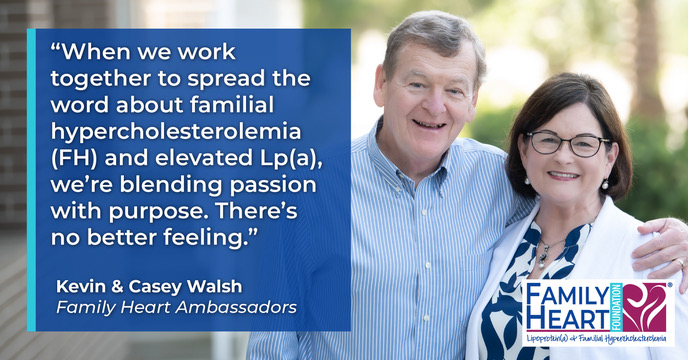

FH can put entire families at risk for early heart disease, as it can be passed down from generation to generation. Each first-degree relative of a person with FH has a 50% chance of inheriting FH. Left untreated, men with FH have a 50% risk for a coronary event, such as a heart attack, by age 50; women have a 30% risk by age 60.
Anyone with a family history of early heart disease and/or severely elevated cholesterol should be screened for FH. The American Academy of Pediatrics recommends universal cholesterol screening of all children between the ages of 9 and 11. Children with a family history of FH should be screened at age 2. Family screening is essential: We never find an individual with FH, we find a family.
For further information, please visit The Family Heart Foundation, where you will find extensive information related to this common disorder and resources to help you find a physician who understands why it’s so important to #KnowFH. In addition, feel free to use the contact me link for printed information, to have us speak with your organization, or to have us host a table at your health fair. We are eager to spread the word and work enthusiastically to ensure that those with FH are found and treated appropriately.
For a more personal take on the impact of familial hypercholesterolemia in my own family and the support provided by The Family Heart Foundation, check out my contributions to the conversation on their webpage:
“My social media feed is filled with all sorts of wishes for success and happiness and, most of all, good health in the 365 days that lie ahead. My 65th full year on the planet stretches out ahead of me, ripe with possibility…”
https://familyheart.org/why-each-new-year-brings-hope
“I’ve had a pretty unusual life. My father died at 50 of heart disease, when I was 11. Nine years later, my 27-year-old brother–my only sibling–had a sudden fatal heart attack… At 20, I was the only member left in my family…”
https://familyheart.org/caseys-story-family-history-heart-disease
In 2021, I was asked to write a first-person account of living with FH for Circulation: Genomics and Precision Medicine, a journal of the American Heart Association. I’m grateful for another opportunity to illustrate the impact early diagnosis and appropriate treatment over the course of 45 years can have on disease management and longevity for individuals with familial hypercholesterolemia.
https://www.ahajournals.org/doi/pdf/10.1161/CIRCGEN.120.003243
Later that year, WebMD got in touch to ask if I would write a year-long monthly patient perspectice blog on hereditary high cholesterol. These posts are evergreen. I hope they will help those with FH and other genetic lipid disorders feel understood and less alone.
https://blogs.webmd.com/cholesterol-management/casey-mulligan-walsh

ELEVATED LIPOPROTEIN A, OR Lp(a), is an important genetic factor that can increase the risk of developing atherosclerosis (hardening of the arteries) and cardiac events, like heart attacks and strokes. Lp(a) levels are not affected by lifestyle changes but are most entirely predetermined by one’s genetic makeup. Approximately 1 in 5 individuals have elevated levels of Lp(a), though testing is infrequently done.
For further information on the impact of elevated Lp(a), testing, and treatment, please visit The Family Heart Foundation, where you will find extensive information related to this factor and resources to help you find a physician who understands why it’s so important to #KnowLpa.
Feel free to use the contact me link for printed information, to have us speak with your organization, or to have us host a table at your health fair. We are eager to spread the word and work enthusiastically to ensure that those with elevated Lp(a) are found and treated appropriately
Latest News From the Advocacy Front
In February 2025, American Heart Month, and in conjunction with the launch of my memoir, The Full Catastrophe: All I Ever Wanted, Everything I Feared, WNYT13, the Albany, NY, NBC affiliate, invited me to discuss my book and the impact familial hypercholesterolemia has had on my family across generations—including me. I’m always excited to raise awareness of FH and elevated Lp(a), and it’s extra special when I can weave in my own story of loss and finding grief beside joy, something many of affected by genetic lipid disorders know all too well.
In December 2024, I had the opportunity to appear on Radio Health Journal along with Dr. Laurence Sperling, Family Heart Foundation Chief Medical Officer, to discuss the impact of undiagnosed familial hypercholesterolemia on those who are affected and experience early heart events as well as on the family members who have lost them at an early age.
In November 2023, I was contacted by the folks at Health Monitor Network who were putting together a publication on familial hypercholesterolemia (FH) and wanted to interview me and—get this—put me on the cover. What?!
Since 2018, my husband Kevin and I have worked as ambassadors to
- raised awareness of FH at a quarterly meeting of the Schenectady Coalition for a Healthy Community at Ellis Hospital in Schenectady, NY, and at a meeting of the Colonie-Guilderland Rotary Club. We put a face on FH, discussing its impact in my family; provided essential information to educate those in attendance about who might have FH, how it’s treated, and where to go for more information; and provided literature for reference and dissemination in the community.
- hosted a table at several of the Freihofer Run for Women Health Fairs in Albany, NY
- I participated as a panelist for several years in the annual Tweetathon on FH Awareness Day, September 24th, with an ultimate reach of tens of millions of people. It was an hour well spent.











